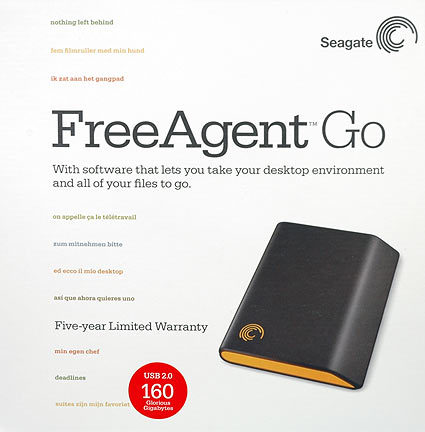2.5" External HDD Spring Fever
Seagate FreeAgent Go 160 GB
There are various options under the FreeAgent product line: Pro, Desktop, Go and Go Small. The Pro offers up to 750 GB capacity, modular exchangeable interfaces, a synchronization solution and a six-month free trial for 500 MB of additional online backup storage. Pro is a desktop version, which cannot be upgraded with Firewire and doesn't carry eSATA. The FreeAgent Go Small is based on a 1" hard drive and offers 12 GB. Seagate's FreeAgent Go, which we received, is a stylish new 2.5" based external hard drive. It comes with a USB 2.0 interface, using a Momentus 5,400 RPM hard drive.
There is not much to say about the hardware: It's a plain, straightforward 2.5" storage product with a USB 2.0 cables that offers two connectors for the sake of providing sufficient energy to the drive. A single 500 mA USB 2.0 connector might not be capable of supplying enough power to spin up the drive. Seagate applies a real-time 256 bit AES encryption and provides a whopping five-year warranty on all FreeAgent drives. The enclosure is black with an orange bottom and Seagate logo and it is stylish enough to attract attention at your next business meeting.
The stand-out feature is the FreeAgent technology, which is based on what you might already know as U3. FreeAgent, however, is based on Ceedo. It is designed to install applications onto the external storage device (not onto the host PC), so they can be available on every host PC. In other words, FreeAgent is all about "portable software." The FreeAgent manager program is located on a separate partition on the drive, which mounts as an optical drive (read-only). The manager starts automatically as soon as the storage device is plugged into a free USB 2.0 port. It requires Windows 2000 with Service Pack 4, Windows XP or Windows Vista, but you need a rather recent Ceedo version in order to run it on Vista (our FreeAgent Go 160 GB worked fine with Vista Enterprise). Software has to be compatible to work with FreeAgent devices. This means that applications need to be designed to write their program information into the Windows registry, and to clean up their traces when the FreeAgent device is removed. Ceedo can also be purchased separately on the Ceedo Website at http://www.ceedo.com/.
Get Tom's Hardware's best news and in-depth reviews, straight to your inbox.
Current page: Seagate FreeAgent Go 160 GB
Prev Page Apricorn EZ Gig II Software Next Page Seagate FreeAgent Go 160 GB, Continued
Patrick Schmid was the editor-in-chief for Tom's Hardware from 2005 to 2006. He wrote numerous articles on a wide range of hardware topics, including storage, CPUs, and system builds.
